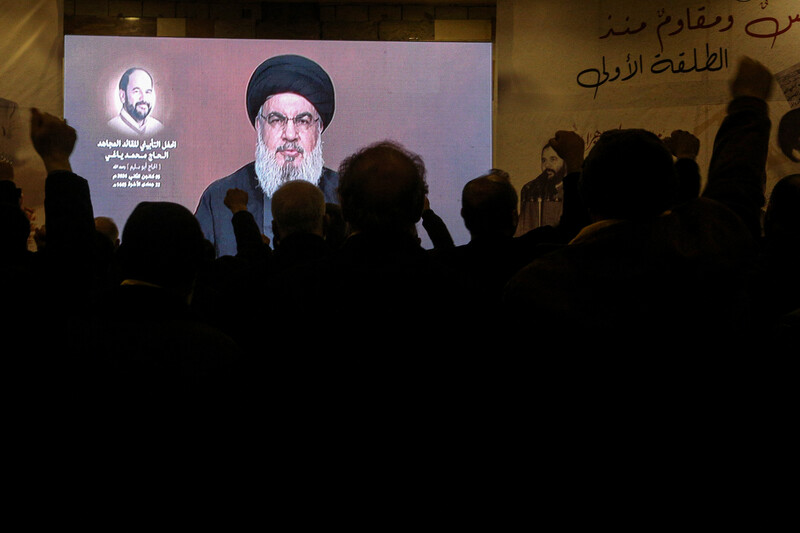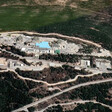The Electronic Intifada 13 January 2024

Hizballah Secretary General Hassan Nasrallah addresses supporters on 5 January.
DPAAs Israel desperately searches for victory in Gaza after three months, the potential for an expanded regional conflict increases.
On 2 January, an Israeli airstrike in the heart of Dahiyeh, Beirut’s southern suburb, assassinated Sheikh Saleh al-Arouri.
Al-Arouri was the deputy head of Hamas’s political bureau and was killed with other Hamas members, including two leaders of the movement’s al-Qassam military wing, Samir Fandi and Azzam al-Aqra.
Since October 8, the Israel-Lebanon boundary has witnessed escalating clashes between Hizballah and the Israeli military. Hizballah and Hamas have had close relations since the 1990s and have been pillars of the “Axis of Resistance.”
The Lebaneses Shiite group was not involved in the planning of the 7 October Operation Al-Aqsa Flood but it has engaged in daily strikes against Israeli targets since.
The conflict between Israel and Hizballah had operated according to understood rules of engagement up until al-Arouri’s assassination. That was despite Israeli military and political leaders threatening to launch a broader campaign, and the initial displacement, according to Israeli media, of 200,000 residents of northern Israel (now closer to 80,000).
A month before al-Arouri’s assassination, The Wall Street Journal reported that Israeli Prime Minister Benjamin Netanyahu had given orders to the country’s spy agencies to hunt down Hamas leaders living in Lebanon, Turkey and Qatar.
In 2018, the US State Department’s Rewards for Justice Program placed a $5 million bounty on al-Arouri. However, on 3 January this year, US State Department spokesperson Matthew Miller denied that Washington had prior knowledge of the assassination or Israel’s involvement in the attack.
Dahiyeh Doctrine
The assassination in the heart of the Dahiyeh was a dangerous escalation and residents were shaken. Randa, who lives near the targeted building but did not want her last name published, said: “Only a few minutes earlier my husband and I passed by the site of the explosion.”
While military operations had been largely confined to the southern boundary with Israel, “we are starting to worry now,” she told The Electronic Intifada. “What we see in Gaza, we may see in Lebanon and we are afraid that it is going to be worse.”
Dahiyeh is one of the most populated areas in Beirut. Hizballah maintains offices in the suburb, including for social services and the party’s political officials.
It is also home to the Burj al-Barajneh Palestinian refugee camp where over 30,000 Palestinian refugees reside. This includes thousands of Palestinian refugees who fled Syria due to its civil war.
During Israel’s 2006 invasion of Lebanon, Dahiyeh was the site of heavy aerial bombardment. As part of the so-called “Dahiyeh Doctrine” of disproportionate violence, Israel leveled entire residential complexes, damaged infrastructure and killed over 1,000 civilians.
Over the past three months, the Dahiyeh Doctrine has been applied to Gaza with far more devastation and deaths.
The day after al-Arouri’s assassination, Hizballah Secretary General Hassan Nasrallah delivered a previously scheduled speech marking the fourth anniversary of the assassination of Iranian Major General Qasem Soleimani by the United States. He explained that al-Arouri’s death was an act of “blatant Israeli aggression and a serious crime that we cannot remain silent about. It will not remain without response or punishment.”
Three days later, on 6 January, the threat of a broader conflict began to increase after Hizballah struck Israel’s Meron military base.
Located on top of Mount Jarmaq, the base is a key installation for surveillance and air traffic control. Hizballah’s missile attack appeared to severely damage the base and was the most severe blow that Israel has received to date on that front.
In response, Israel assassinated Hizballah’s Wissam Hassan al-Tawil in an airstrike on his car near his hometown of Khirbet Selm in south Lebanon. Al-Tawil was a commander of Hizballah’s elite Radwan unit which has been deployed along the border with Israel.
Difficult choices
Before the assassinations of al-Arouri and al-Tawil, Hizballah had preferred to maintain the status quo. According to Hoda Rizk, a professor of political sociology at the Lebanese University, “Lebanon does not want to be dragged into the war for two reasons. The first is Lebanon’s precarious economic situation, and the second is the lack of actual popular support for the war.”
Israel, however, appears determined to establish new rules of engagement even at the risk of a broader war.
Hizballah is now faced with the difficult choices of either not responding or continuing to escalate.
Ignoring the assassinations would signal to Israel that Lebanon’s airspace is open for more attacks without reprisal. And Hizballah does not believe this is an acceptable option.
After meeting with Josep Borrell, the European Union’s foreign policy chief, Muhammad Raad, the head of Hizballah’s parliamentary bloc, said, “If the enemy wants to wage a war on Lebanon, let him know that this is the war in which we will go to the end.”
Muhammad Raad’s son Abbas was a member of Hizballah’s military wing and was killed in an Israeli airstrike in southern Lebanon in November.
In the first month of the war on Gaza, the head of the Israeli National Security Council Tzachi Hanegbi threatened to “return Lebanon to the Stone Age if we will see teasing from Lebanon.”
Accompanying the threats, Israeli leaders have sought to implement the UN Security Council Resolution 1701. Issued after the 2006 Israeli invasion, the resolution calls for the area between the boundary with Israel (“Blue Line”) and the Litani river to be free of any armed personnel.
These demands have been part of mediation efforts by the United States and the European Union.
Desperately seeking victory
US President Joe Biden has delegated senior advisor Amos Hochstein to mediate between Hizballah and Israel. Hochstein had previously negotiated a maritime boundary agreement between Lebanon and Israel that allowed for developing natural gas fields.
According to media reports, Israel demanded that Hizballah remove its fighters 6 miles from the Lebanese boundary as part of a broader diplomatic agreement.
However, Hizballah has rejected any demands to withdraw from the boundary area or to disarm. It has insisted that any Israeli air strikes against Lebanese cities or towns will be met with missile attacks against similar targets in Israel.
Hizballah has also made it clear to American, European, Iranian and Arab mediators, as well as in public statements, that the clashes on the Lebanese border will not stop until Israel ends its war on Gaza.
In response to al-Tawil’s assassination, Hizballah attacked the Israeli military’s northern headquarters in Safed on 9 January. Israel killed four Hizballah fighters in separate strikes and targeted al-Tawil’s funeral procession, leaving one dead and three wounded.
By the end of the day, Israel’s health ministry had warned hospitals in the northern regions to begin preparing for casualties in the thousands.
Meanwhile, in his fourth visit to the region since 7 October, US Secretary of State Blinken urged leaders of the countries he visited to use their influence to prevent an “endless cycle of violence.”
Despite a death toll above 23,000 Palestinians and over 59,000 injured, Washington remains unwilling to support a ceasefire in Gaza.
“Blinken is seeking an image of victory for the United States and for Israel,” Hoda Rizk said.
Netanyahu’s escalations in Lebanon are all too predictable. According to Rizk, Netanyahu hopes military operations outside of Gaza will prolong his political life and delay a corruption trial indefinitely.
The Biden administration continues to support Netanyahu’s campaign in Gaza and shield Israel from accountability. And Israel will only pursue a wider war in Lebanon if it has Washington’s approval.
Dalal Yassine is a non-resident fellow with the Jerusalem Fund/Palestine Center in Washington, DC. The views in this article are those of the author and do not necessarily reflect those of The Jerusalem Fund and Palestine Center.





